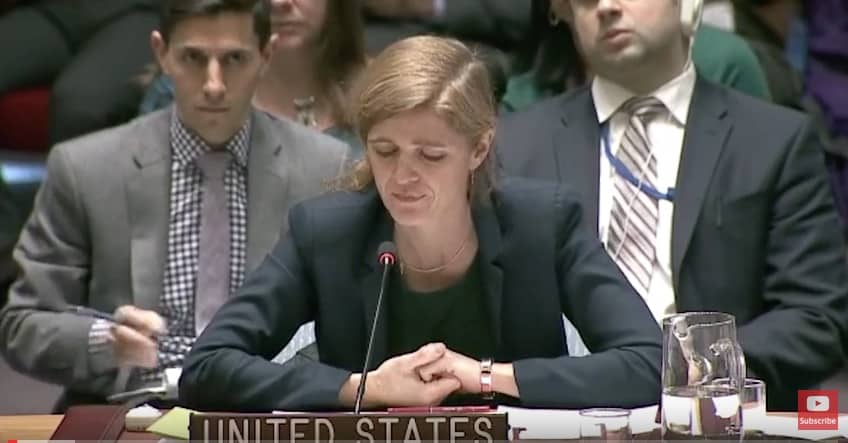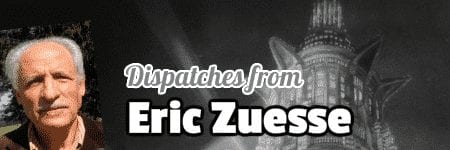On 21 November 2014, in a vote at the United Nations on a Resolution opposing a resurgence of the racist-fascist ideology (opposing the ideology that’s commonly called “nazism”) which Resolution was titled “Combating glorification of Nazism, neo-nazism and other practices that contribute to contemporary forms of racism, racial discrimination, xenophobia, and related intolerance”, 115 nations voted “Yes” to pass the Resolution, 3 voted “No” to reject it, and 55 voted “Abstain,” meaning they didn’t want to express a view on the resolution. An additional 19 didn’t vote at all on it (decided to absent themselves from that roll-call, for whatever reason — basically, not even saying whether they were neutral on it by voting “Abstain” — just said nothing at all on it). Warmonger Samantha Power was invited on numerous occasions to present the Obama's "administration case" for meddling in Syria. Her entire tenure, characterised by cynical shilling for constant imperial aggression and the spread of nazism, was preceded and followed in shame by Susan Rice, Condi Rice and the current disgrace Nikki Haley. The document that they were voting on had been posted complete on 17 November 2014, and is still posted in its entirety here. As can be seen there, it had been proposed by the following 29 nations: Bangladesh, Belarus, Benin, Bolivia (Plurinational State of), Burkina Faso, Brazil, Côte d’Ivoire, Cuba, Democratic People’s Republic of Korea, Equatorial Guinea, Guinea, India, Kazakhstan, Kyrgyzstan, Myanmar, Namibia, Nicaragua, the Niger, Nigeria, Pakistan, Russian Federation, Rwanda, Seychelles, Sri Lanka, Syrian Arab Republic, Turkmenistan, United Republic of Tanzania, Venezuela (Bolivarian Republic of), and Viet Nam. 11. Welcomes the call of the Special Rapporteur for the active preservation of those Holocaust sites that served as Nazi death camps, concentration and forced labour camps and prisons, as well as his encouragement of States to take measures, including legislative, law enforcement and educational measures, to put an end to all forms of Holocaust denial; The roll-call on the vote, along with each nation’s vote on it, is posted here. These are the 55 nations that Abstained: Albania, Andorra, Australia, Austria, Belgium, Belize, Bosnia, Bulgaria, Chad, Croatia, Cyprus, Czech Republic, Democratic Republic of the Congo, Denmark, Estonia, Finland, France, Georgia, Germany, Greece, Hungary, Iceland, Ireland, Italy, Japan, Latvia, Libya, Liechtenstein, Lithuania, Luxembourg, Mali, Malta, Monaco, Montenegro, Netherlands, New Zealand, Norway, Panama, Poland, Portugal, Republic of Korea, Republic of Moldova, Romania, Samoa, San Marino, Slovakia, Slovenia, South Sudan, Spain, Sweden, Switzerland, The Former Yugoslav Republic of Macedonia, Turkey, United Kingdom, Yemen. These are the 3 nations that voted “No”: Canada, Ukraine, United States. Editor's Note: Canada's vote and support for US criminal policies proves one more time that Canada has degenerated into a vassal of Washington (following the example of Britain, which claims junior partner in imperial aggressions). As well, it shows that liberals cannot be trusted. How many people, seduced by the youth and telegenic appeal of Justin Trudeau, believed the man represented a departure for the better? Prior reporting, by me, about this matter, has included: 21 June 2015, "America’s U.N. Ambassador Continues Standing Up for Nazis”. 20 August 2017, “Trump’s Fascism versus Obama’s Fascism”. The old warning about trusting liberals is borne out by Canada's new telegenic [dropcap]T[/dropcap]hat was reporting only a preliminary vote, even before the Resolution was presented for an actual floor-vote of the entire Assembly. (Obama lost Palau, which ended up reversing totally and voting “Yes” on it, but then he gained Canada as their replacement third “No” vote on it.) That news-report received little exposure at CBS or elsewhere. At CBS News online, there were only 25 reader-comments to it. Typical was: “So we voted against anti-Nazism because it would deprive the Nazis the freedom of expression to demand banning the freedom of expression.” Readers accepted at face-value what was being said. CBS issued no subsequent news-report on the matter, to correct nor even to clarify anything in their cryptic report. However, that reason which had been represented as having been given to CBS for America’s intended vote against the Resolution was not the actual reason that America’s U.N. Ambassador gave for it, as I reported, after the vote, on 24 November 2014: Samantha Power, the U.S. Representative at the U.N., gave as her reason for voting against the resolution, its unacceptability to the Government of Ukraine. “Her delegation was concerned about the overt political motives that had driven the main sponsor of the current resolution. That Government had employed those phrases in the current crisis in Ukraine. That was offensive and disrespectful to those who had suffered at the hands of Nazi regimes. Therefore, the United States would vote against the resolution.” In other words: the U.S. opposed this resolution, supposedly, because it was offensive to Ukraine, even though the very term “Ukraine,” and all other conceivable references to Ukraine, were and are entirely absent from it. If Ukraine, whose government the U.S. had installed during the U.S. coup in February 2014, had been instructed by the U.S. to vote in favor of the Resolution, they would have done so. The government that the U.S. coup overthrew, would probably have abstained on a Resolution such as this (because it was trying to be accepted both by the United States and by their own neighbor, Russia, which the U.S. Government is obsessed to conquer), but the newly installed Ukrainian Government was being ruled by members and supporters of Ukraine’s traditional two nazi parties and thus would have voted for the Resolution only if the U.S. Government had instructed them to do that. They might then have laughed in private about the matter, but they would nonetheless have done whatever they were instructed by Washington to do. After all, they had to — the U.S. had placed them into power. The only international poll that has asked the question “Which country do you think is the greatest threat to peace in the world today?” found that by an overwhelming margin, the United States was mentioned by more people throughout the world than any other. But Americans chose Iran as being the most dangerous country. That was a scientifically sampled poll by WIN/Gallup, of 67,806 people in 65 countries, and was published on 30 December 2013. Anyone who wants further, and up-to-date (as of August 18th), information on how nazism proceeds in our time, under U.S. international leadership, will find that here. [premium_newsticker id=”154171″]

 Investigative historian Eric Zuesse is the author, most recently, of They're Not Even Close: The Democratic vs. Republican Economic Records, 1910-2010, and of CHRIST'S VENTRILOQUISTS: The Event that Created Christianity.
Investigative historian Eric Zuesse is the author, most recently, of They're Not Even Close: The Democratic vs. Republican Economic Records, 1910-2010, and of CHRIST'S VENTRILOQUISTS: The Event that Created Christianity.![]()
 By now, it seems clear that the leading feature of today’s nazism is its hypocrisy. George Orwell already had that figured out, in his prophetically futuristic dystopian 1949 novel, 1984. But the real version, of nazism in our era, fascinates me even more than does the fictional one. Not even Orwell’s genius could match it, in my book.
By now, it seems clear that the leading feature of today’s nazism is its hypocrisy. George Orwell already had that figured out, in his prophetically futuristic dystopian 1949 novel, 1984. But the real version, of nazism in our era, fascinates me even more than does the fictional one. Not even Orwell’s genius could match it, in my book.
The Nations that Accept Nazism Today
426
[premium_newsticker id=”154171″]
About the author
 Investigative historian Eric Zuesse is the author, most recently, of They're Not Even Close: The Democratic vs. Republican Economic Records, 1910-2010, and of CHRIST'S VENTRILOQUISTS: The Event that Created Christianity.
Investigative historian Eric Zuesse is the author, most recently, of They're Not Even Close: The Democratic vs. Republican Economic Records, 1910-2010, and of CHRIST'S VENTRILOQUISTS: The Event that Created Christianity.![]()
 By now, it seems clear that the leading feature of today’s nazism is its hypocrisy. George Orwell already had that figured out, in his prophetically futuristic dystopian 1949 novel, 1984. But the real version, of nazism in our era, fascinates me even more than does the fictional one. Not even Orwell’s genius could match it, in my book.
By now, it seems clear that the leading feature of today’s nazism is its hypocrisy. George Orwell already had that figured out, in his prophetically futuristic dystopian 1949 novel, 1984. But the real version, of nazism in our era, fascinates me even more than does the fictional one. Not even Orwell’s genius could match it, in my book.
Subscribe
Login
0 Comments
Oldest
previous post




